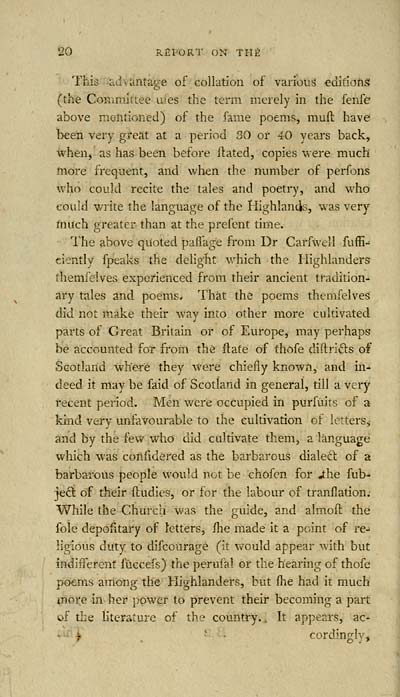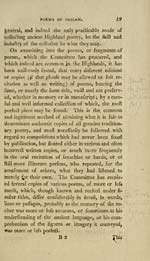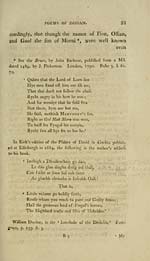J. F. Campbell Collection > Report of the Committee of the Highland Society of Scotland, appointed to inquire into the nature and authenticity of the poems of Ossian
(46)
Download files
Complete book:
Individual page:
Thumbnail gallery: Grid view | List view

20 REPORT ON THE
This L-.d vantage of collation of variout> editions
(the Committee vves the term merely in the fenfe
above mentioned) of the fame poems, muft have
been very great at a period 30 or 40 years back,
when, as has been before ftated, copies were much
more frequent, and when the number of perfons
who could recite the tales and poetry, and who
could write the language of the Highlancis, wa.s very
ftiach greater than at the prefent time.
The above quoted paflage from Dr Carfwell fuffi-
eiently fpeaks the delight which the Highlanders
fhemfelves experienced from their ancient tradition-
ary tales and poems.* That the poems themfelves
did not make their way into other more cultivated
parts of Great Britain or of Europe, may perhaps
be accounted for from the ftate of fhofe diftrifts of
Scotland where they were chiefly known, and in^
deed it may be faid of Scotland in general, till a very
recent period. Men were occupied in purfuits of a
kind very unfavourable to the cultivation of loners,-
and by the fev^^ who did cultivate them, a language
which was confidered as the barbarous dialefl: of a
barbarous people would not be chofen for jhe fub-
je£l of their fhudies, or for the labour of tranflation.
"While the Church was the guide, and almoft the
foie depOiitary of letters, /lie made it a point of re^
ligious duty to difcourage (it would appear with but
indifferent fuccefs) the perulal or the hearing of thofe
poems among the Highlanders, but fhe had it much
more in her power to prevent their becoming a part
of the hterature of the country, , It appears, ac-
'•' > cordingly.
I
This L-.d vantage of collation of variout> editions
(the Committee vves the term merely in the fenfe
above mentioned) of the fame poems, muft have
been very great at a period 30 or 40 years back,
when, as has been before ftated, copies were much
more frequent, and when the number of perfons
who could recite the tales and poetry, and who
could write the language of the Highlancis, wa.s very
ftiach greater than at the prefent time.
The above quoted paflage from Dr Carfwell fuffi-
eiently fpeaks the delight which the Highlanders
fhemfelves experienced from their ancient tradition-
ary tales and poems.* That the poems themfelves
did not make their way into other more cultivated
parts of Great Britain or of Europe, may perhaps
be accounted for from the ftate of fhofe diftrifts of
Scotland where they were chiefly known, and in^
deed it may be faid of Scotland in general, till a very
recent period. Men were occupied in purfuits of a
kind very unfavourable to the cultivation of loners,-
and by the fev^^ who did cultivate them, a language
which was confidered as the barbarous dialefl: of a
barbarous people would not be chofen for jhe fub-
je£l of their fhudies, or for the labour of tranflation.
"While the Church was the guide, and almoft the
foie depOiitary of letters, /lie made it a point of re^
ligious duty to difcourage (it would appear with but
indifferent fuccefs) the perulal or the hearing of thofe
poems among the Highlanders, but fhe had it much
more in her power to prevent their becoming a part
of the hterature of the country, , It appears, ac-
'•' > cordingly.
I
Set display mode to: Large image | Transcription
Images and transcriptions on this page, including medium image downloads, may be used under the Creative Commons Attribution 4.0 International Licence unless otherwise stated. ![]()
| Permanent URL | https://digital.nls.uk/81742805 |
|---|
| Description | Volumes from a collection of 610 books rich in Highland folklore, Ossianic literature and other Celtic subjects. Many of the books annotated by John Francis Campbell of Islay, who assembled the collection. |
|---|
| Description | Selected items from five 'Special and Named Printed Collections'. Includes books in Gaelic and other Celtic languages, works about the Gaels, their languages, literature, culture and history. |
|---|

